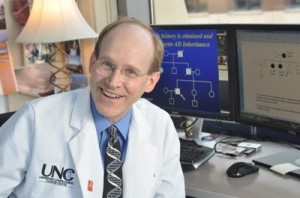It’s been about a year and a half since I sat down with Jim Evans, MD, PhD, and Bryson Professor of Genetics and Medicine at the UNC School of Medicine, to learn about NCGENES, a research project to develop processes and a supporting cyberinfrastructure that will allow researchers, clinicians and patients to take full advantage of whole genome and whole exome sequencing. The project is funded by the National Human Genome Research Institute, one of the National Institutes of Health.
The patients enrolled in NCGENES – about 750 of them over four years – have undiagnosed conditions that likely have genetic causes. Through sequencing and an innovative, streamlined analysis process, the researchers hope to find genetic markers for their conditions, make diagnoses, and if possible, treat them.
Elizabeth Davis was one such patient, and her remarkable story illustrates the impact that routine genome and exome analysis can have on ordinary people. According to a story in Cosmopolitan, Davis’ undiagnosed condition had limited her ability to walk for 30 years and confined her to a wheelchair in recent years. After having her genome sequenced as an NCGENES participant, researchers determined she suffered from dopa responsive dystonia, a condition caused by a mutation that leaves the body unable to produce the chemical dopa and the nervous system unable to function properly. The condition is easily treatable with medication, and today, 11 months after her diagnosis, Davis has shed wheelchair and crutches and walks on her own. She is also now free of painful and debilitating leg spasms that had occurred daily for the prior 30 years.
According to Dr. Evans, RENCI plays an “indispensible and fundamental” role in the NCGENES project, developing the technical infrastructure that tracks, categorizes, and helps to analyze genetic material as it makes its way through multiple laboratories. Congratulations to Jim Evans, Co-PI Jonathan Berg of the UNC School of Medicine, the NCGENES team at RENCI (Kirk Wilhelmsen, also with the UNC School of Medicine, Chris Bizon, Dan Gillis, Phil Owen, Jason Reilly, Charles Schmitt, Erik Scott, and Dylan Young) and, of course, to Elizabeth Davis.
Perhaps this is a glimpse at how genetic research can revolutionize medical diagnostics and healthcare in the years to come.
To read the Cosmopolitan story, click here. To read the RENCI story on NCGENES, click here.
-Karen Green



